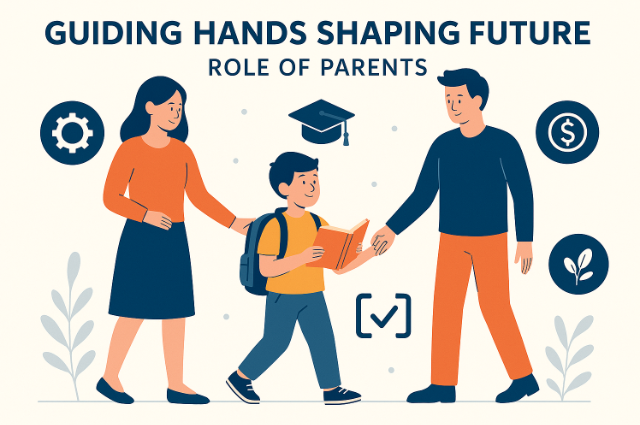
Parents have a no-doubt significant role to play in our lives, not only in an emotional or sentimental sense, but also in the very practical, everyday sense of learning to grow up and become capable, responsible adults. Through early childhood into adulthood, their impact is profound, inculcating our values, habits, and decision-making abilities. Though every family situation will be different, the role that parents have to play in a child's development is vast and varied. This article discusses how parents shape our lives in practical and realistic ways.
One of the first lessons parents are apt to impart on children is discipline. Habits as simple as brushing teeth, going to bed on time, or completing homework aren't things that come naturally—they're acquired. Parents give kids a daily routine that enables them to learn about responsibility and time management. As we mature, these basic habits remain with us, enabling us to better structure our lives and accomplish goals more effectively. Without this early framework, numerous individuals also have difficulty with routine in adulthood.
From choosing the right school to helping with homework and encouraging extracurricular activities, parents often act as the first academic support system. They guide us in making educational choices based not only on interest but also on practicality and prospects. Whether it’s enrolling a child in a coding class, advising on college majors, or motivating us to prepare for exams, parents invest their time and effort to help us succeed. Their participation also refines our decision-making abilities. Parents teach children how to make considered choices by debating advantages and disadvantages, or simply by showing them responsible living in their daily lives. Children gradually develop the ability to make wise and assertive choices.
Our parents tend to be our first exposure to understanding money—how we can get it, save it, and spend it effectively. We may notice them budgeting when they buy groceries, or setting aside money for large things like holidays or schooling. We are then learning the importance of money. Afterwards, many parents allow their kids to join in on real-money financial conversations, educating them on checking accounts, spending, and investing. Those experiences create financial knowledge, important for later life.
Parents also often financially support us in our young adult years, for example, while attending college or establishing our initial job or company. Such support is not only financial but also provides us space to develop without pressure in the short run, leading us to make wiser long-term choices. Most of us turn to our parents for career advice. Whether they are professionals, business owners, or stay-at-home parents, their experience in the world offers real-world wisdom. They can assist in networking, learning about industry needs, or even provide exposure to varying careers by showing us individuals or experiences. Some parents take it a step further by assisting in practicing interviews, going over resumes, or encouraging us through job rejection.
Most significantly, they provide a balanced perspective—passion tempered with pragmatism. If a child is interested in being an artist, for instance, practical parents will advise on how to nurture that interest—maybe by mixing it with graphic design, freelancing, or teaching.
Life presents problems at every step, and parents guide us through most of them. Whether it is handling peer pressure, academic failure, health problems, or workplace disputes, they present solutions through logic, sensitivity, and experience. Though emotional guidance is involved, parents also show us how to deal with conflicts in a practical sense—how to remain calm, think of alternatives, or act. Their problem-solving style will frequently serve as a model for how we respond to situations. Watching the way they deal with their work, relationships, or crises in silence teaches us about maturity and perseverance.
From the way parents treat others, be it relatives, friends, helpers, or strangers, we learn interpersonal skills. They are our first role models in how to communicate, empathize, listen, apologize, and negotiate. In today’s world, social intelligence is as valuable as academic intelligence, and much of it stems from our home environment.
Parents also guide us through our relationships, showing us boundaries, respect, and trust. Whether friendship advice or relationship advice, they provide insight based on life experience that assists us in avoiding mistakes or learning from them quickly.
Whereas schools and society instill in us what is right or wrong, parents reinforce these values more persistently and deeply. They demonstrate to us honesty, respect, responsibility, and compassion—not ideals, but everyday habits. When we do wrong, parents are more likely to hold us in check and teach us our lesson, as opposed to aimlessly punishing us. Behind our successes, there is usually quiet support from our parents, skimping their budgets to pay for our schooling, getting up late to work with us on projects, or shelving their dreams to advance ours. These are not showy acts, but quiet, practical choices that significantly affect our lives.
It's simple to overlook parents, but they play a much larger role in our lives than emotional support or typical responsibilities. They are our initial instructors, money managers, career guides, emergency officials, and life coaches, all at times simultaneously. Their impact, while sometimes overlooked, is crucial in creating our independent, skilled, and stable selves. Understanding their practical contribution makes them not only better appreciated as caregivers but also as genuine constructors of our future.
. . .
